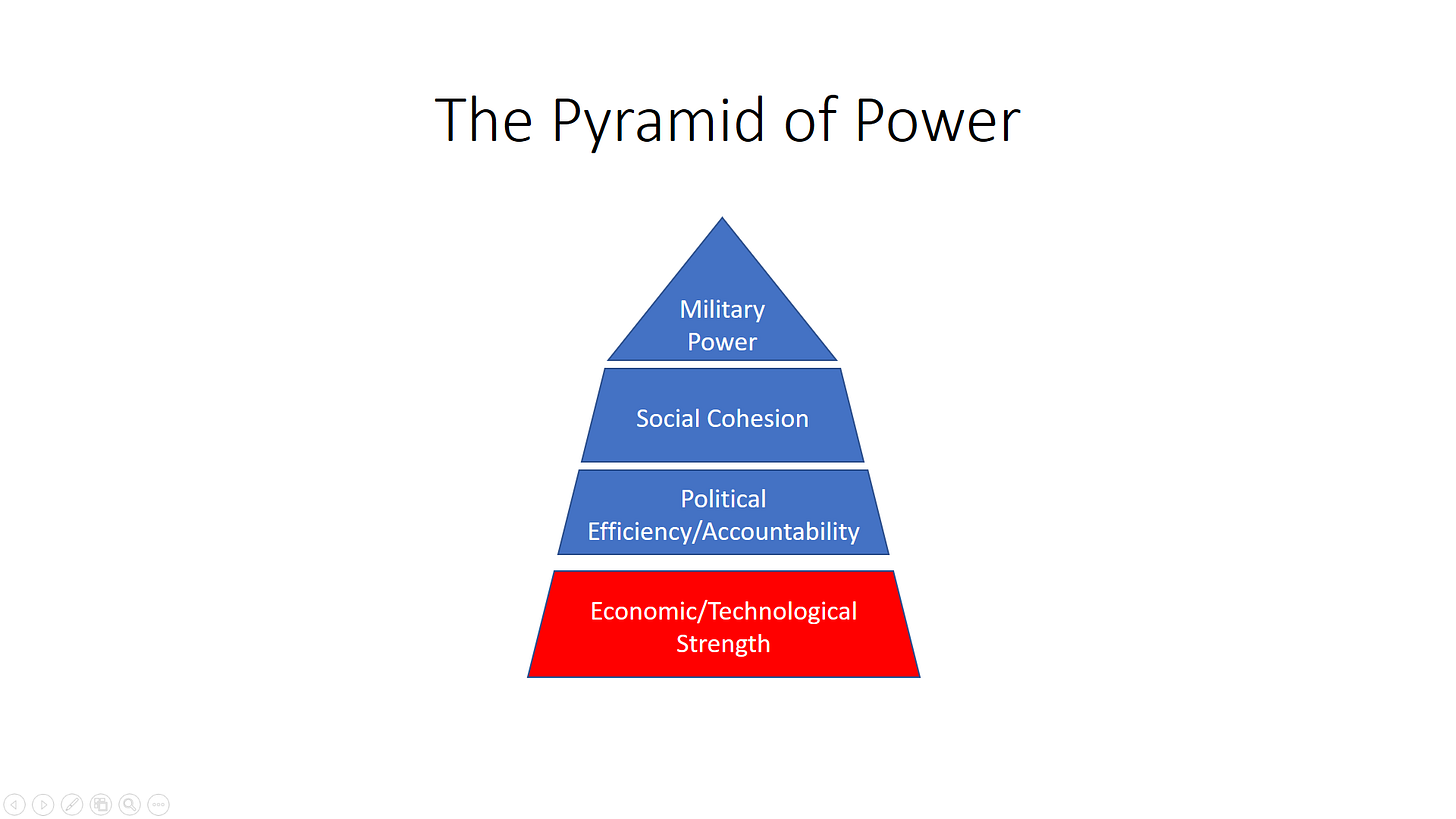What Makes a Power "Great"?
The Pyramid of Power
I’ve had a number of enquiries about my different posts saying Russia is not a great power—usually asking “Ok smart-ass, if Russia is not a great power—what is a great power?” Its a fair question, and I thought it would be worthwhile looking back through the last two centuries (Industrial era onwards) to say what I think is a great power, or more accurately what is needed to be a great power. This will hopefully show why I’ve never considered Putin’s Russia to be a great power and how its helped shape my response to the possibility of a Russian full-scale invasion and what has happened since February 24, 2022.
To help answer the question of what makes a great power, I’ve come up with a structural model that shows the different elements that I think are important and, maybe more important, how they interact.
Without further ado, I present to you the ‘Pyramid of Power’.
To understand the construct of the pyramid, you need to look at the bottom in red (which will be the subject of today’s writing) and understand how that builds to the top. Military Power, which is often looked at as what makes a power great, is a product that isunderpinned by the other 3—starting with Economic/Technological strength. Like all good pyramids the real strength is in the base while the cap is the more visible element (which is a real handicap when it comes to understanding power).
This relationship between the layers, and their order of priority, is extremely important to understand, and its why you need to be very skeptical of a military which is not sustained by a powerful economy . Rarely is a war decided by the military equipment that a power brings to the table when it starts (unless that power is an extreme great power and has been able to generate such military power in peacetime that it can overwhelm others). In most cases, its the economic/technological ability to sustain and increase power during a war that matters far more. A power needs to make up losses and indeed build more and better equipment, as normally a war involves a general increase in military performance.
Economic/Technological Strength
To be a ‘Great’ power it is a sine qua non that a nation be one of the economic/technological leaders of its era. This was easily the most overlooked problem when it came to the analysis of Russia before February 24, though the reality of its importance is now slapping many people in the face. I was really perplexed that people were talking about Russia as a great power at this time, when economically it would never have made the grade in the past. I built one of my criticisms of those who were lauding Russian strength around this point in this article published in January, 2022 arguing that deferring to Russia over Ukraine was even more stupid than deferring to Hitler over Czechoslovakia.
“The most obvious difference between Germany in 1938 and Russia in 2022 is that the latter is economically much weaker, with a declining population and low life expectancy. Quite why Russia is considered so powerful today is perplexing. Yes it remains nuclear-armed (though the idea that they would use them over Ukraine is preposterous—when someone asks you that, ask them back what exactly Russia would target). And yes, Russia has some well-designed pieces of military equipment—but that is very different than having resilient military systems.
What Russia is not, however, is economically powerful and it lacks the ability to mount sustained military operations and deploy a wide range of military forces at the same time. Russia in global terms has approximately the 10th largest economy in the world; larger than Spain but smaller than Canada. Moreover, it is largely a resource-extraction economy, and has not shown the ability to produce high technology products long-term and at scale. How many high quality Russian technology based products have you purchased lately?”
(For full article see here: https://thecritic.co.uk/the-new-appeasement/
Keep reading with a 7-day free trial
Subscribe to Phillips’s Newsletter to keep reading this post and get 7 days of free access to the full post archives.

